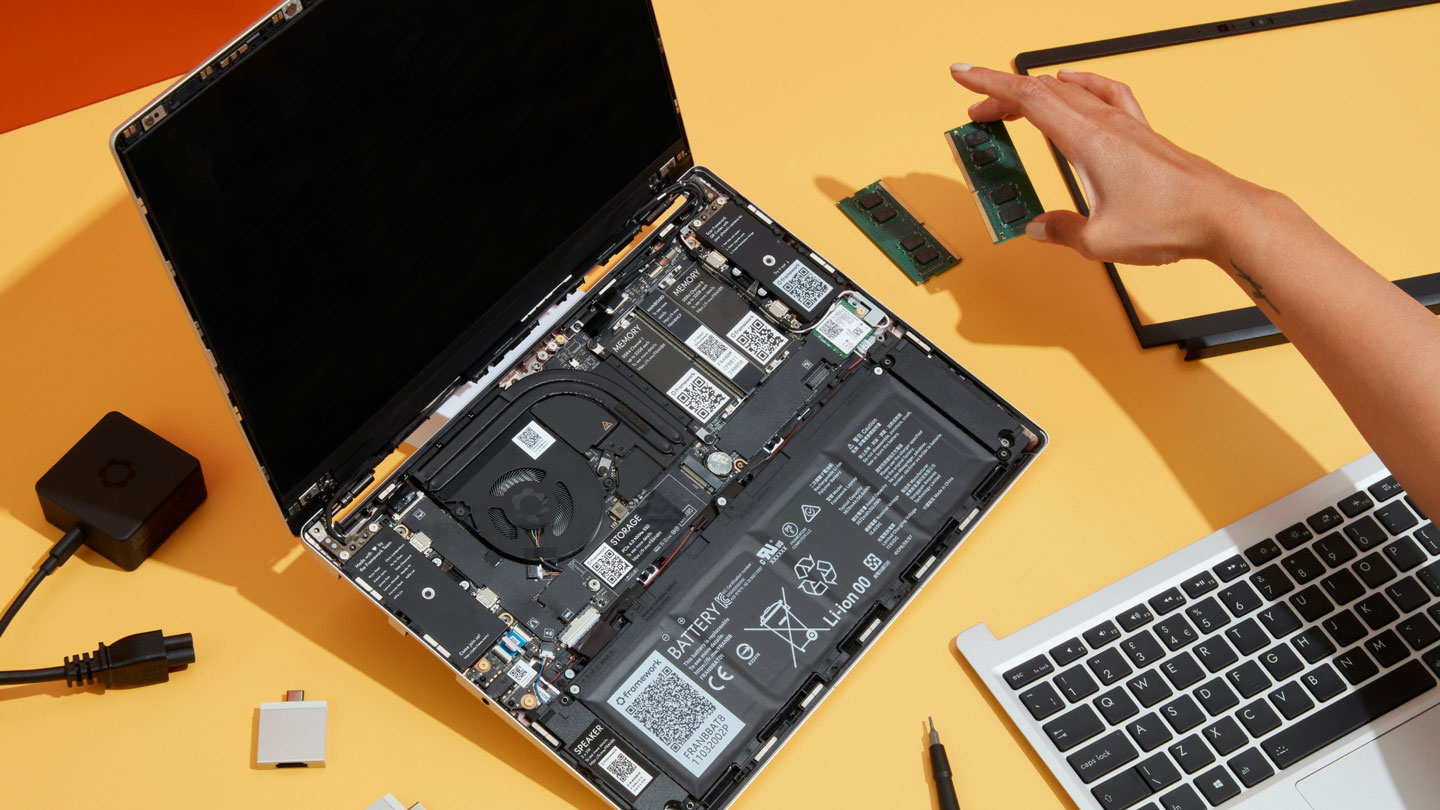Most of us consider an ‘upgradeable laptop’ to mean one that lets you add a stick of RAM or offer room for an extra SSD — but hardware startup Framework wants to reboot our expectations of technology entirely.
Framework Laptop Specs
| Display: | 13.5-inch IPS (2256×1504) |
|---|---|
| CPU: |
Intel Core i5-1135G7; Intel Core i7-1165G7; Intel Core i7-1185G7 |
| Memory: | 8 – 64GB DDR4-3200 |
| Graphics: | Intel Iris Xe |
| Storage: | 256 – 1TB NVMe SSD |
| Ports: | Configurable |
| Other: |
Fingerprint reader 1080p 60fps webcam Hardware privacy switch |
| Battery: | 55 Wh |
| Price: |
From $999 (prebuilt); $749 (DIY) |
They want to make laptops as upgradeable as a traditional desktop PC. To do that they’ve designed a notebook engineered with expandability and modularity in mind. Think Fairphone or Google’s (failed) Project Ara, but for your main portable.
And, as of today, DIY enthusiasts willing to back this vision of true ownership can do so. The Framework Laptop is now available to pre-order, priced from $749 for a ‘assemble it yourself’ kit, and from $999 for a pre-built unit.
What does that price get you?
The $999 base model comes with an Intel Core i5-1135G7 processor, 8 GB RAM, a 256 GB SSD, and Windows 10 Home.
Costing a little more, the $1399 Performance model touts an Intel Core i7-1165G7, 16 GB RAM, 512GB SSD and Windows 10 Home OS.
Topping the table is the $1999 Professional model that packs an an Intel Core i7-1185G7, 32 GB RAM, a 1 TB SSD. This version also comes with the Windows 10 Pro OS by default.
Buyers can upgrade RAM up to 64GB DDR4-3200 and max out the storage options.
But the coolest feature (to me, anyway) are the hot-swappable ‘expansion’ modules.
Hot-Swap Expansion Modules
The base model comes with four hot-swappable USB Type-C expansion modules. These slot in and connect to the laptop using USB Type-C and …provide Usb Type-C functionality.
When buying the laptop users can trade these for any combination of USB Type-C, HDMI, DisplayPort, microSD card slot, or additional storage options. While some of the modules do marginally increase the price they’re overall relatively cheap, ranging from $9 to $19.
Even better: Framework plans to offer more modules in the future — hopefully ethernet, otherwise missing — and says third-party companies are welcome to create their own modules.
Buyers willing to bring their own RAM, SSD, and power cable you buy the Framework Laptop DIY edition. This (naturally) requires a bit of assembly but costs less, from as little as $749.
The rest of the laptop’s specs? Those are solid too. There’s a 13.5-inch 2K display with 100% RGB gamut; a 55Wh battery; backlit keyboard with 1.5mm of travel; and a hardware kill switch to nuke the on-board dual MEMS microphones.
And replacement parts for (virtually) every bit of this laptop are available, including the battery, display, webcam, chassis, hinges, keyboard, speakers, heatsink, fan… And so on.
The laptop will offer CPU upgrades too. However, as the processor isn’t socketed it will require replacing the entire mainboard. For Windows users this could require a new OS license, which is an extra cost to keep in mind.
What about Linux support?
While the prebuilt units only come pre-loaded with Windows 10 the DIY option comes without one. Framework say they’ve “tested for compatibility with common Linux distributions” and will publish guides on using them in the near future.
Pre-order today
Perhaps the most surprising thing is how good this laptop looks. Despite its ‘modular’ nature the Framework Laptop isn’t unwieldily: it is lighter and thinner than a 13-inch MacBook Pro!
Pre-orders are open now for buyers in the US direct from the Framework website. Those putting down a $100 desposit today will (if all goes to plan) get their device in June. Pre-orders for Canada, Europe, and Asia are expected to open towards the end of the year.
Thanks to Edward
- (via: Engadget)
